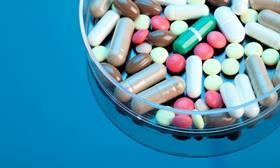- Treasury forced to inject £205m into DH last year after overestimate of PPRS payment
- Weakening pound because of Brexit uncertainty could increase money going to NHS
- Pharmaceutical industry claims rebate was also lower because NHS is benefiting from direct discounts
An increase in drug imports from Europe was one of the factors which led to a lower than expected rebate from the pharmaceutical industry to the NHS last year, HSJ can reveal.
The Association of the British Pharmaceutical Industry has said a handful of companies leaving the pharmaceutical price regulation scheme and discounts agreed with the NHS also lowered the rebate.

The PPRS is a five year scheme agreed between the ABPI and the Department of Health, which came into effect in January 2014.
Under the agreement, if NHS spending on branded medicines exceeds an “allowed” growth rate then the industry pays the difference back to the DH.
In 2015-16, spending growth was lower than expected, resulting in a reduced PPRS payment and a hole in the NHS budget which the Treasury was forced to plug by transferring an extra £205m to the DH.
David Watson, the ABPI’s director for pricing and the PPRS, told HSJ that high growth in the first year of the scheme linked to the arrival of some new medicines had resulted in an overestimate of growth in future years.
This pushed up the forecast for PPRS income in 2015-16 that was used in the DH’s budget setting.
However, growth actually slackened in 2015. The DH had predicted spending to increase by 4.55 per cent but it later had to revise the figure down to just 0.9 per cent.
UK-wide income from the PPRS decreased from an estimate of £995m to £800m, forcing the Treasury to plug the gap.
Mr Watson said there were several factors explaining the lower growth, including an increase in “parallel imports” from the continent – a completely legal practice that involves importing and selling drugs from other countries to take advantage of price differences.
Parallel imports are not covered by the PPRS and when they increase they take sales away from the British companies that are in the scheme.
Mr Watson said there was a 35 per cent increase in parallel imports in 2015 related to the strengthening of the pound against the euro.
However, he said that a weakening pound because of uncertainty about the UK leaving the EU could see this trend “completely reversing”, resulting in increased British sales and “more income through PPRS to the DH”.
Mr Watson said while membership of the PPRS had been “quite stable”, the exit of five companies from the voluntary scheme also contributed to slower growth, although the impact of this was “much smaller in… scale”.
Companies giving discounts directly to the NHS was another factor, he said. While this lowered growth in the national drugs bill and the resulting PPRS payment, the NHS would benefit from the price cuts.
However, Mr Watson admitted there was not “clear” agreement between the ABPI and the DH on the significance of discounting in relation to lower growth.
He said: “Fundamentally we still believe that having this type of deal is a good thing for patients ultimately, [the NHS and the industry]; it’s trying to balance everybody’s interests.”
A DH spokesman said the £205m received from the Treasury was not solely to cover the PPRS shortfall.
He added: “The PPRS allows NHS patients to access the best and latest drugs at a price that benefits the taxpayer, while also providing pharmaceutical companies with the certainty they need in order to flourish.”



























1 Readers' comment